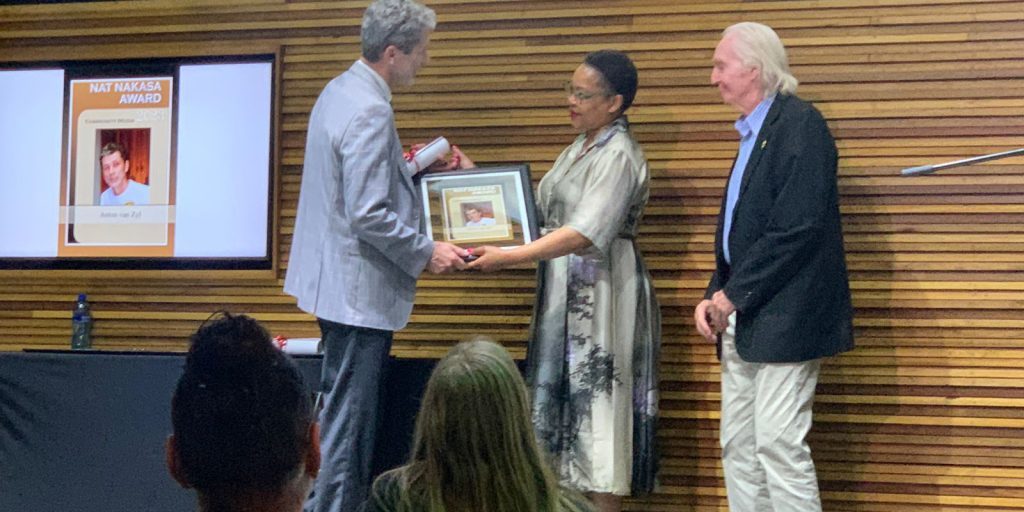To bear the lightness of being asks a lot of courage
AIP publisher, Anton van Zyl, reflects on winning the Nat Nakasa award and the courage required to keep publishing in this tough financial environment.
That’s me in the corner. That’s me in the spotlight, losing my religion … And I don’t know if I can do it. Oh no I’ve said too much, I haven’t said enough.
The lyrics of the rock group REM’s song rushed through my mind while walking onto the stage during the Nat Nakasa award function. So, there I was, very literally on the top of Sandton, with spotlights shining on me.
“What does the Nat Nakasa award mean to you?” the interviewer asked.
What does it mean?
I suppose it’s a humbling experience. To be recognised for what you have been doing over three decades is flattering. Just the mere mention of the Nat Nakasa name evokes memories that include Jon Qwelane, Peter Magubane, Greg Marinovich, Max du Preez and Alf Kumalo, all previous winners. They were awarded for their bravery, for the courage to stand up against an unjust system and, like Nat Nakasa decades ago, be willing to be expelled from their beloved country for telling the uncomfortable truth.
Am I brave? Do I even deserve to be mentioned alongside these iconic names?
Our exposés on the Lottery corruption took some courage. You have to pick up a trail and follow that. You have to confront the evil people and endure the abuse. You must ignore the subtle (and sometimes not so subtle) threats and also be relentless. But you’re not the first to face this kind of pressure. It’s part of the job.
Was it brave to take on the local municipality to force them to release information that proves how corrupt the tender systems are? This was a fight that made its way to the High Court. Eventually we won, which probably was very significant for our industry. But again, it’s not as if there are many alternatives. You either take up the gauntlet, or you retreat and watch as the corruption continues.
Throughout the years there have been many such battles. Whether it’s exposing a Ponzi scheme or reporting about a dishonest business, you keep on writing. The stories come your way, and you do your best to cover them as objectively as possible. Is it courageous? Probably not. It’s our job.
But to keep on going, week after week, month after month and year after year, is not easy. But, with time, our newspapers have gradually become part of the cultural heritage of the region.
Those who know will tell you that local newspapers are not normal beasts. They exist to inform and entertain, but they are not detached from the community. You quickly lose count of the number of obituaries you wrote. You try not to remember how you left a house in tears, after interviewing a father who lost his wife and two daughters in an accident. You visited many gruesome scenes; you reported on shocking court cases.
But you also reported on the joy of being human. You celebrated with the local sports heroes, and you marvelled alongside the mothers and fathers at their childrens’ concerts.
Your own passion became intertwined with that of the community that mostly respected you as their messenger. You started to carry that burden, even though it was not always easy.
How often have you heard the saying: “People don’t want to read bad news”?
That’s not true. You want to bring the lightness into their world, but the darkness always lurks, and they want to know about it.
One of the greatest writers of the 20th century, Milan Kundera, published his masterpiece, “The unbearable lightness of being” in 1984. As the title suggests, it concerns the burdens that we carry and the choices we make. “The heavier the burden, the closer our lives come to the earth, the more real and truthful they become,” he wrote. But we also need to live life as if there is no tomorrow.
Perhaps we, as the local messengers, are like Sabina, one of the main characters in the story. She is an artist who reflects, especially in her lifestyle, the lightness of the world – the fun and carelessness. But because we are too close to our communities, we can’t escape the darker moments.
A famous quote from the book says:
“For there is nothing heavier than compassion. Not even one’s own pain weighs so heavy as the pain one feels with someone, for someone, a pain intensified by the imagination and prolonged by a hundred echoes.”
That’s our job as local media servants – to report with such compassion.
Nat Nakasa died in exile at the age of 28. He committed suicide by jumping from the window of a friend’s seventh floor apartment in Central Park West, New York. Nakasa was “a native of nowhere … a stateless man [and] a permanent wanderer.”
It takes courage to stay alive. To keep on being the loyal messenger in a local community is not easy. Very often you feel that the burden is not bearable, but you also realise the importance of what you do.
Our industry is in a financial crisis. Most of us barely survive, with our revenue options reduced to feeding on scrap. But what we have created and maintained is something worth fighting for. It needs courageous women and men to be part of that battle. If a Nat Nakasa award means that I can inspire others to keep on publishing, I am very proud of this achievement.



